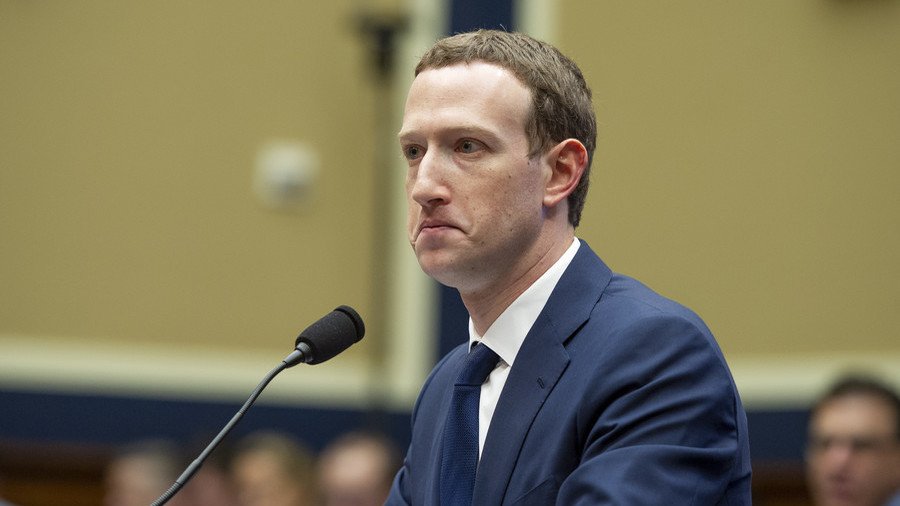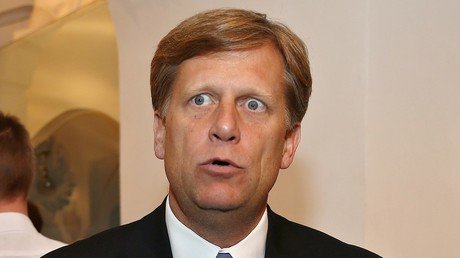Facebook should stick to German laws on Holocaust denial, Berlin says after Zuckerberg’s comments

Facebook must comply with Germany’s laws banning Holocaust denial regardless of its own internal polices, authorities gave a warning to the company CEO, Mark Zuckerberg, who said Holocaust deniers' comments should not be removed.
“There should be no place for anti-Semitism anywhere!” German Justice Minister Katarina Barley said in a Twitter post in response to Zuckerberg’s recent comments he made in an interview to the Recode technology news website. She went on to say that anti-Semitism includes “verbal and physical attacks on Jews as well as the denial of Holocaust” and is “punishable by us and will be strictly prosecuted” in Germany.
Für #Antisemitismus darf es nirgendwo einen Platz geben! Dazu gehören verbale und körperliche Angriffe auf Juden genauso wie die Leugnung des #Holocaust. Auch letzteres steht bei uns unter Strafe und wird konsequent verfolgt. #Zuckerberghttps://t.co/8x4jk9ZWCh
— Katarina Barley (@katarinabarley) July 19, 2018
Her angry outburst was provoked by the Facebook’s CEO comments, in which he said that Holocaust deniers’ comments should not be deleted from the social network platform just because they “get something wrong.”
“There is a set of people who deny that the Holocaust happened,” he told Recode on Wednesday, adding that, even though he personally finds such position “deeply offensive,” he still “does not believe” that “our platform should take that down because I think there are things that different people get wrong.” Zuckerberg also said that he did not believe that Holocaust deniers “are intentionally getting it wrong.”
READ MORE: Facebook bans photographer who went ‘off to shoot some Christians’ for work
In Germany, Holocaust denial is punishable by law. Social media sites can face fines amounting to up to € 50 million ($ 58 million) if they fail to promptly remove such hateful messages. The social networks in Germany are obliged to delete “obvious” hateful content within 24 hours after a complaint is filed, while other reported content should be dealt with within a week.
“No one should defend those who deny Holocaust,” German Foreign Minister Heiko Maas, who actually introduced the so-called "network enforcement law” while he was a justice minister, said in a tweet, commenting on the recent developments. The legislation fully came into force on January 1, 2018.
#Antisemitismus darf nirgendwo einen Raum haben. Wer den Holocaust leugnet, den sollte niemand verteidigen. Im Gegenteil: Weltweit muss alles getan werden, um jüdisches Leben zu schützen.#Zuckerberghttps://t.co/bTcH5WjQjN
— Heiko Maas (@HeikoMaas) July 19, 2018
German officials are far from the only people concerned by Zuckerberg’s comments, which actually provoked quite a stir on social media. Some people criticized the Facebook CEO by saying that he is the one who apparently got something wrong.
So apparently Mark Zuckerberg is under the impression there's some good faith debate going on over whether the Holocaust happened? https://t.co/Qdn4E7n2jlpic.twitter.com/ClLngQqesS
— Benjy Sarlin (@BenjySarlin) July 18, 2018
Others seemed to be offended by his comments, which they called “unacceptable and outrageous.” Some people also said the “Facebook leadership just … has no moral compass” and is not fit for the job it is doing.
Unacceptable & outrageous remarks by @MarkZuckerberg about #Holocaust denial. Must clarify his remarks & make clear Holocaust denial is a willful and hateful attempt to trivialize murder of 6 million Jews. No room for Holocaust denial on @facebook... https://t.co/XVUTxTqbFz
— Rabbi Shmuley (@RabbiShmuley) July 19, 2018
This is what gets me. Zuckerberg has been largely radio silent since Cambridge Analytica.His first major media event since, and he just blurts out “Holocaust deniers don’t have bad intent.”This wasn’t a mistatement. Facebook leadership just fundamentally has no moral compass.
— Brianna Wu (@Spacekatgal) July 19, 2018
My general point that no one should be doing the filtering of news for 2.1 billion people. But Mark Zuckerberg defending the sincerity of Holocaust deniers suggests that we may have picked the single worst person to do what is an impossible job. pic.twitter.com/j3GELcn0w4
— Matt Stoller (@matthewstoller) July 18, 2018
Many people also disputed Zuckerberg’s statement that Holocaust deniers do not intend to do any harm and warned that allowing them to continue could lead to potentially dangerous consequences. Jonathan Greenblatt, the CEO of the Anti-Defamation League, said that “Holocaust denial is a willful, deliberate and longstanding deception tactic by anti-Semites that is incontrovertibly hateful, hurtful, and threatening to Jews.”
“Holocaust denial is a willful, deliberate and longstanding deception tactic by anti-Semites that is incontrovertibly hateful, hurtful, and threatening to Jews.” Read the full statement from our CEO @JGreenblattADL ⬇️ pic.twitter.com/vF5ydzplKM
— ADL (@ADL_National) July 18, 2018
Others said that Holocaust denial could well be the first stage of a new Holocaust and lead to the revival of Nazism if left unchecked.
The thing that most defenders of hate speech like Mark Zuckerberg don’t get is that it’s Stage 1 of a Holocaust. Hitler didn’t start the holocaust by hearding Jews into trains. He had to poison the minds of Germans first so that they would gain the “Lock them up” mentality.
— Steve Redmond (@sjredmond) July 18, 2018
Holocaust denial is not a “mistake”, Mr. Zuckerberg. It has a clear purpose: negate, distort, minimize, and trivialize proven facts about the Nazi genocides against Jews, Roma, and others. The goal is to rehabilitate the racist, antisemitic, xenophobic ideology of Nazism. [1/8]
— AskHistorians (@askhistorians) July 18, 2018
The public outrage prompted Zuckerberg to issue a clarification to his statement just hours after his interview was published. “I personally find Holocaust denial deeply offensive, and I absolutely didn’t intend to defend the intent of people who deny that,” he said. He still tried to defend his position by saying that Facebook’s goal was not to “prevent anyone from saying something untrue” but to “stop fake news and misinformation spreading across our services” by essentially limiting such content’s distribution in the News Feed.
Still, some people apparently did not find his arguments to be convincing enough.
Zuckerberg: Oh no! Our algorithm is promoting too much holocaust denial. Bad algorithm! Bad! Show people ... 5% less holocaust denial
— popular comedy account “the pixelated boat” (@pixelatedboat) July 19, 2018
Facebook has recently been involved in a number of controversies related to its policy of dealing with hate speech and offensive content. In March, the social network giant refused to remove a post containing a death threat against the UK Labour leader Jeremy Corbyn. In July, however, it went as far as to remove excerpts of the US Declaration of Independence during the Independence Day celebrations after considering them ‘hate speech.’














